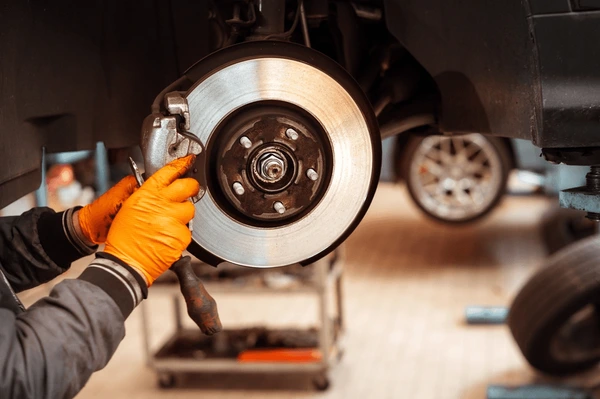Your vehicle’s braking system is one of its most critical safety components. Regular brake inspections and maintenance ensure that your car stops efficiently, reducing the risk of accidents and costly repairs. Here’s why maintaining your brakes is essential and how to recognize when they need attention.
Why Brake Inspections Are Important
- Safety First – Properly functioning brakes help prevent collisions by allowing you to stop quickly and safely.
- Prevents Costly Repairs – Addressing minor brake issues early can prevent more expensive repairs later.
- Improves Vehicle Performance – Well-maintained brakes contribute to a smoother, more controlled driving experience.
- Extends Brake System Lifespan – Routine inspections and timely replacements prolong the life of your brake pads, rotors, and calipers.
Signs Your Brakes Need Maintenance
1. Squeaking or Grinding Noises
Unusual noises when braking often indicate worn brake pads that need replacement.
2. Vibrations or Pulsations
If you feel vibrations in the steering wheel or pedal when braking, your rotors may be warped or uneven.
3. Soft or Spongy Brake Pedal
A brake pedal that feels soft or sinks to the floor may signal air in the brake lines or low brake fluid.
4. Car Pulling to One Side
Uneven braking can be caused by worn brake pads, a stuck caliper, or an issue with the brake fluid distribution.
5. Warning Light on Dashboard
The brake warning light signals an issue with the braking system that requires immediate attention.
How Often Should You Get a Brake Inspection?
- Every 10,000-15,000 miles for routine inspections.
- At least once a year or during regular vehicle maintenance.
- Immediately if you notice any signs of brake trouble.
Brake Maintenance Tips
- Replace brake pads before they wear down completely to avoid rotor damage.
- Check brake fluid levels and top off if necessary.
- Have your braking system professionally inspected during routine oil changes.
- Avoid aggressive braking to reduce excessive wear on the brake system.
Final Thoughts
Regular brake inspections and maintenance are essential for your safety and vehicle longevity. Addressing brake issues promptly can prevent dangerous driving conditions and expensive repairs.
If you notice any brake-related issues, visit our shop for a professional inspection and service today!


